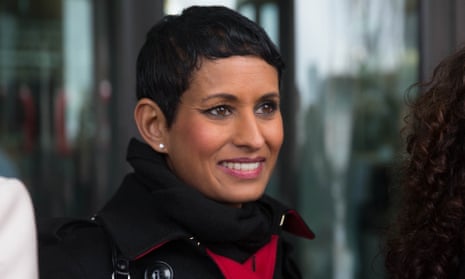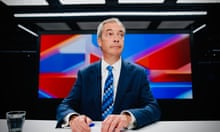The BBC attempted to stop an external investigation into Naga Munchetty’s comments about Donald Trump, prompting the broadcasting regulator, Ofcom, to declare it had “serious concerns around the transparency of the BBC’s complaints process”.
Tony Hall, the BBC director general, last week overturned the corporation’s decision to uphold a viewer complaint regarding the BBC Breakfast host, after she was deemed to have expressed a personal view about the US president.
Ofcom launched its own inquiry following a number of complaints about the original decision, and has concluded that Munchetty’s exchange with her co-host, Dan Walker, did not breach the broadcast code’s guidelines requiring due impartiality.
But in a sign of the growing crisis within the BBC, which has already resulted in a staff revolt over the handling of the row, Ofcom went further and focused its criticism on the BBC’s internal processes and its refusal to provide additional evidence as to how the complaints unit reached the original decision.
As a result, the regulator took the unusual decision to publish its correspondence with the BBC’s editorial standards chief, David Jordan, who oversees its editorial policy guidelines and has ultimate oversight over the complaints process. Jordan argued strongly that Ofcom did not have the authority to step in and examine the case and refused to cooperate with the external investigation.
He told the media regulator there “is no proper basis for Ofcom’s proposed action” due to the agreement that governs which BBC complaints can be assessed by the external regulator. Jordan said Hall had already reversed the decision and the Munchetty row neither counted as exceptional circumstances nor an incident where Ofcom had the power to launch an investigation of its own accord.
“I am disappointed, therefore, that Ofcom is assessing a broadcast with a view potentially to undertaking an investigation for which it has no clear jurisdiction, rather than handling complaints it has received about the programme in the normal way,” he said.
The public broadcaster has guarded the independence of its in-house complaints process, usually only allowing Ofcom to step in when viewers are unsatisfied with the original BBC ruling. In this case, the viewer is believed to have been satisfied with the original ruling against Munchetty, casting doubt on whether the media regulator had the authority to step in under the existing arrangements.
In its own assessment of the exchange between Walker and Munchetty, the regulator concluded it had not broken Ofcom’s broadcasting code rules on due impartiality.
Ofcom said the discussion about Trump was compatible with its rules because it was in the context of a chat between two hosts on the BBC Breakfast sofa. They said viewers understood the difference in tone between traditional news bulletins and the magazine-style programme, which “has over many years featured informal exchanges between the presenters on news items”.
It concluded: “This style of analysis can be engaging for viewers and can enhance public understanding of the news. Audiences are familiar with this format and, in our view, it would have shaped their expectations of the presenters and programme in this case.”
Ofcom’s Kevin Bakhurst, himself a former senior BBC News executive, said the case raised concerns about whether the public broadcaster’s complaints process could still command the confidence of the public, not least because it could not explain on what basis – other than public outrage – the director general had overturned the original decision.
“We’ll be requiring the BBC to be more transparent about its processes and compliance findings as a matter of urgency,” he said.
A BBC spokesman said: “We note Ofcom’s finding and the fact they agree with the director general’s decision.”









